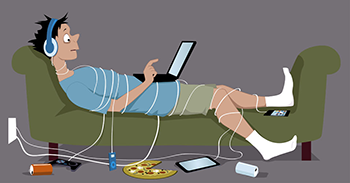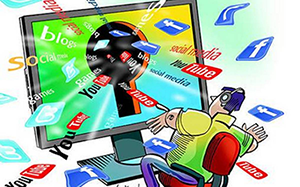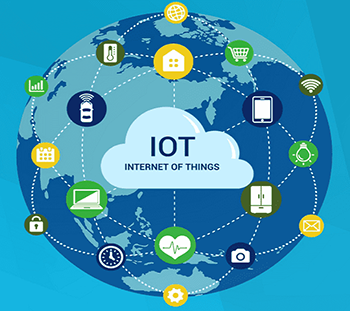Digital Wellbeing in the era of the Internet
Being in control of technology enables us to use its full potential and gain all the benefits of it, whereas learning to control the use of the internet and technology saves us our sanity.
-
Posted on 26-Feb-2021
, by Nivedita Pawar, Consultant Counsellor
“Digital Wellbeing is about creating and maintaining a healthy relationship with the internet and technology. It’s about how technology serves us and moves us towards our goals, rather than distracting us, interrupting us or getting in the way of life. Being in control of technology enables us to use its full potential and gain all the benefits of it, whereas learning to control the use of the internet and technology saves us our sanity.
The Internet is being used on a daily basis for multiple reasons known to us such as education, financial transactions, learning to cook, communicating with family and friends etc. Thus, the use of the internet is not only important but it has definitely become a highest priority in our day to day life.
We all are digitally connected, as students, education today is primarily conducted online by participating in seminars, quizzes, examinations and attending online lectures, therefore creating new perspectives on enhancing our skills and knowledge. As internet and technology becomes more and more integral to everything we do, it can sometimes distract us from the things that matter most to us. We believe digital technology should improve life, not distract from it.In this blog we will be looking at understanding digital wellbeing in the times of the internet as a means to connect to the outside world as well as the ill-effects of internet addiction, ways to identify and resolve the same.
Understanding Internet Addiction:
 Internet addiction is when an individual has a compulsive need to spend a great deal of time on the Internet, to the point where other areas of life (such as relationships, work or health) are allowed to suffer. The person becomes dependent on using the Internet and needs to spend more and more time online to achieve the same ‘high’.
Internet addiction is when an individual has a compulsive need to spend a great deal of time on the Internet, to the point where other areas of life (such as relationships, work or health) are allowed to suffer. The person becomes dependent on using the Internet and needs to spend more and more time online to achieve the same ‘high’.
Steps to identify internet addiction:
- Social Acceptance v/s Physical Acceptance [in-personal] - increasing amount of time spent online gives a sense of satisfaction. If an individual can’t go online for a longer period of time he/she experiences unpleasant symptoms such as anxiety, moodiness and compulsive fantasizing about the Internet.E.g. comparing oneself with others on social media.
- Internet as a coping mechanism - Using the internet to deal with negative feelings such as guilt, anxiety or depression as the time spent online relieves him/ her from facing difficulties in relationships, work, and school and other pursuits. E.g. engaging in fictional characters affecting relationships with actual humans.
- Losing interest in person relationship v/s virtual relationships - Many-a-times people create a bubble around themselves i.e. they create a fantasy world where they want to perceive everything as perfect whereas in the real world this bubble gets busted they tend to lose interest in their actual relationship with people staying around in their proximity.
- Engagement on Social Media - The desire to constantly monitor social networking sites including mindlessly spending several hours on posts, stories, comments and responding to notifications etc. like Facebook, Instagram, Twitter, YouTube, etc. E.g. Deciding someone’s worth depending upon the interactions on their social media posts.
Dealing with internet addiction:

- Control Screen time – Clear your phone of unessential apps to keep you from constantly checking it for updates. Dedicate specific, limited amounts of time to use your devices. Use applications to help you to be mindful of your screen time – Devices settings, Focus, Stayfree - Screen Time Tracker & Limit App Usage.
- Creating Awareness - Become aware of your behaviors leading to unpleasant or unstable mood swings. Turn screen time into physical activity time. Make mealtime gadget-free time. Prioritize real-world relationships over online relationships. E.g. Track your emotions, thoughts along with behavioral patterns i.e. eating, sleeping, feelings, etc.
- Know your Why - Think about why you use the Internet so much. What makes you go online? Is there a real problem you’re not facing up to? Think about other ways to cope with your problem that don’t involve the Internet.
- Be more Offline in an Online world – Engage yourself in activities that will keep you occupied in doing the actual task by hand rather than a virtual activity, learn online and put them into practice by switching over to offline.
- Meditations and Relaxation - Calm the inner world using relaxation methods like deep breathing or meditation to manage anxiety symptoms created due to fear if missing out FOMO. Keep electronic devices out of the bedroom. Charge them in another room and or turn your clocks and other glowing devices toward the wall at bedtime.
- Rediscover the neglected areas of your life – Break the bubble and step into the real world that surrounds you. E.g. socialize with friends, connect with family members, engage in teaching or playing with younger children, get out, be active in the real world.
- Seek Help – Being open to seeking professional help can help you combat these problems effectively and efficiently. If necessary feel free to reach out to Counsellors, Senior Mentors etc.
Positive ways to make the best of internet:
- The Internet is an integral part of our lives. As much as it does have some negative effects, it can also offer many positive benefits and play an important role in education, health, and general wellbeing of every individual.
- Knowing the possible negative effects can help you take steps to identify and minimize them so that you can still enjoy the positive aspects of technology.
- Social networking - Internet addiction although is bad but it does serve a very positive and helpful manner so we need to be mindful in using the same to our boon than a curse for personal and professional usage.
- Effects of the Internet - It is an advantage as well as a problem. Internet addiction is an umbrella term referring to the compulsive need to spend a great deal of time on the Internet, to the point where relationships, work and health tend to suffer.
- Easy access to education - With the help of online access to thousands of study materials and video tutorials, the Internet has made the lives of students easier. You can just Google a question and there will be several answers at your fingertip in a minute.


As we conclude it is certainly fair to say that life would be tough without the internet. But, there are two sides to a coin likewise; Internet is both a blessing if managed mindfully and can turn out to be a curve if we lose our minds and get addicted to over usage of the same.



 Internet addiction is when an individual has a compulsive need to spend a great deal of time on the Internet, to the point where other areas of life (such as relationships, work or health) are allowed to suffer. The person becomes dependent on using the Internet and needs to spend more and more time online to achieve the same ‘high’.
Internet addiction is when an individual has a compulsive need to spend a great deal of time on the Internet, to the point where other areas of life (such as relationships, work or health) are allowed to suffer. The person becomes dependent on using the Internet and needs to spend more and more time online to achieve the same ‘high’.

